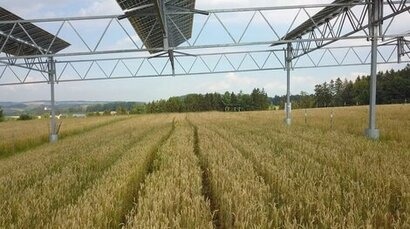
In New York, for example, about 40 percent of utility-scale solar farm capacity has been developed on agricultural lands, while about 84 percent of land deemed suitable for utility-scale solar development is agricultural, according to a previous research study from Zhang’s group.
The engineers showed that solar panels mounted over vegetation have lower surface temperatures compared to those arrays built over bare ground. Solar panels were mounted 4 metres above a soybean crop and the solar modules showed temperature reductions by up to 10 degrees Celsius, compared with solar panels mounted a half-metre above bare soil.
“We now have, for the first time, a physics-based tool to estimate the costs and benefits of co-locating solar panels and commercial agriculture from the perspective of increased power conversion efficiency and solar-panel longevity” said lead author Henry Williams, a doctoral student at Cornell.
Senior author Max Zhang, professor in the Sibley School of Mechanical and Aerospace Engineering, added that there is potential for agrivoltaic systems – where agriculture and solar panels coexist – to provide increased passive cooling through taller panel heights, more reflective ground cover and higher evapotranspiration rates compared to traditional solar farms.
“We can generate renewable electricity and conserve farmland through agrivoltaic systems” said Professor Zhang.
The cooling effect is more significant than that induced by greater panel height; and the passive cooling adds to solar panel efficiency, according to the paper. Better yet, the temperature drops lead to an improved solar panel lifespan – and improved, long-term economic potential.
“As you decrease the solar panel operating temperature, you can increase efficiency and improve the longevity of your solar modules” added Mr Williams. “We’re showing dual benefits. On one hand, you have food production for farmers, and on the other hand, we’ve shown improved longevity and improved conversion efficiency for solar developers.”
Understanding this mutually beneficial concept comes at a critical time for agricultural production, as global food demands are expected to increase by 50 percent by 2050, to feed an anticipated 10 billion people, according to the World Resources Institute. At the same time, it is imperative to accelerate the deployment of renewable energy to mitigate the impact of climate change.
For additional information:

